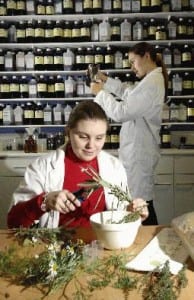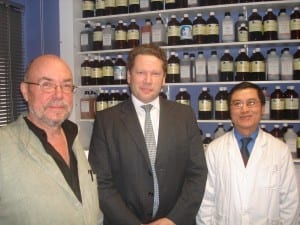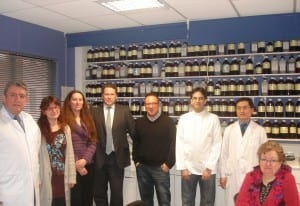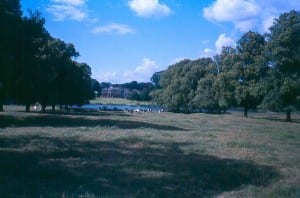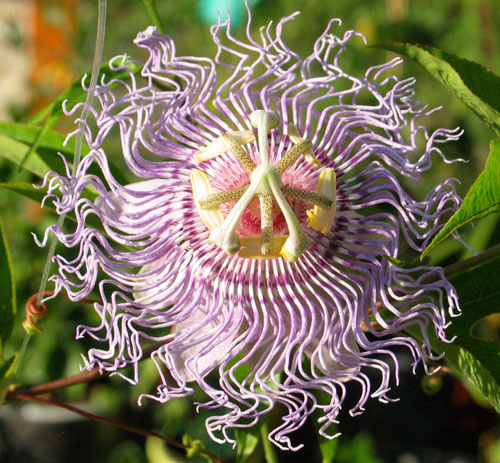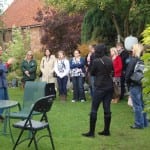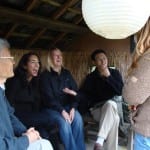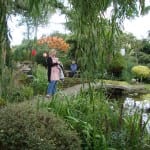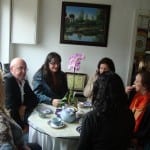It’s not really a good year for Elderberries in Sheffield. Nevertheless, I was determined to make some Elderberry Rob this weekend because I haven’t had any the last couple of years and it’s such a lovely recipe. And I’ve already got more Blackberries than we can eat in a year – it IS a bumper season for them!
Elderberry Rob is an old traditional recipe, used as a warming treatment for coughs and colds. It is quite likely that it has antiviral and immune-enhancing properties, as these have been regularly demonstrated for other Elderberry extracts (e.g. Barak et al). There are many different versions, but basically you make a syrup and add spices – cloves, cinnamon, nutmeg, ginger, allspice, whatever you happen to have in the cupboard. It’s extremely tasty (especially with brandy or rum and a little hot water – like mulled wine but better). My version goes as follows:
Collect as many elderberries as I can find without stripping the trees bare (and whilst being respectful to the spirit of Elder who is always considered in herb folklore to be one of the more ferocious of the tree spirits).
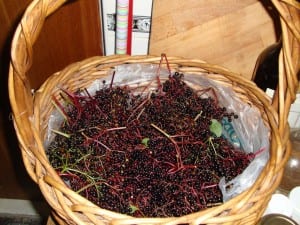
A basket of Elderberries
Strip the berries from the twigs, using a fork and chuck them in a big pan.
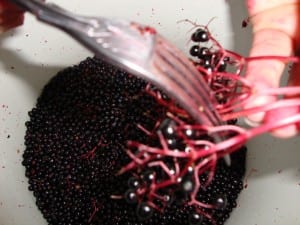
Strip with a fork
Simmer with a little bit of water (just enough to prevent burning) for about half an hour or so (or in my case, until Match of the Day finishes.)
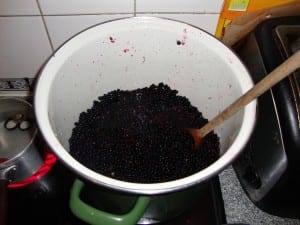
Simmer Elderberries gently with a little water
Meanwhile set some bottles sterilising – easiest method is just to wash them out then stick them in a cold oven, heat it up to about 160, then turn it off and leave the bottles to sit there until you are ready. Boil the lids for a few minutes to sterilise them too.
Then strain it out, preferably through a bit of muslin, but a sieve will do if the muslin all got used up on Blackberries. Measure how much you’ve got, then decide how much sugar to add.
Now, this is a bit of a difficult issue with Elderberries. The usual rule for other herbal syrups is that you add up to twice as much sugar as you have of the liquid. But Elderberries are full of sugar already. Some sources add no sugar at all: others add up to equal amounts of sugar to liquid. It depends on how concentrated your extract is – if you have left it simmering for ages during MOTD, you will need less sugar – if impatient to get on with it, you may use more. To do without sugar entirely, you need to simmer it for a couple of hours or more. This time, I used about 8oz for each pint and then it tasted and looked syrupy.
After adding the sugar, chuck in however much spices you like or happen to have in the cupboard and simmer for half an hour or so to dissolve the sugar and concentrate it a bit more. Then pour it into your sterilised bottles and put the lids on whilst still hot. Use some brandy to swill out your pan. Drink the brandy.
Reference:
Barak, V., Halperin, T., ,Kalickman, I. (2001) ‘The Effect of Sambucol, a black elderberry -based natural product, on the production of human cytokines.’ European Cytokine Network. 12 (2): 290-6

